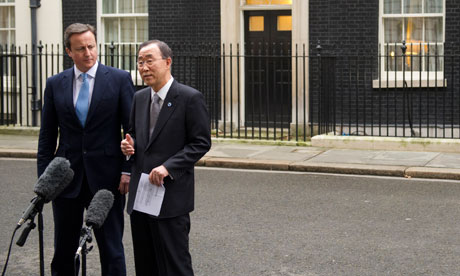A new panel will consider what could replace the Millenium Development Goals after 2015 and it’s time to push business into the spotlight

This week (31 October to 2 November) David Cameron will host the first in-depth meeting of the UN High Level Panel in London – a group of the great and the good who will map out what might replace the Millennium Development Goals (MDGs) post 2015.
Quite rightly, the team have identified jobs and growth as one of the key areas they want to look into. Finding ways to ensure that this growth becomes truly inclusive, and empowers poor and marginalised people to demand their fair share, is something we at Care International are particularly engaged in and why we want to explore the role that business can play in development.
Not on the agenda
Back in 2000 when the original set of targets were drawn up, the role that business could play in lifting people out of poverty didn’t feature. This time around all are agreed it should, but working out how is not proving easy.
Harvard Business School estimates that out of the 82,000 multinational companies out there, only 3,000 or so are exploring inclusive models. And while some industry leaders are emerging (Unilever’s chief executive, Paul Polman, is a member of the UN Panel), globally, this approach is still small fry.
For those of us that believe in the potential that inclusive business models have to offer to development, the MDG moment seems an opportunity not to be missed. Given the economic mess we’re all in today, we clearly don’t need just another nudge – we need a complete rethink.
But what could any new agreement actually urge business to do? And is it time to wield the carrot or the stick to urge more companies – large and small to adopt inclusive ways of working?
Sticks have been the more commonly adopted tactic over recent years. A plethora of standards currently exist to try and hold companies to account but these have nearly all been voluntary, and resemble feeble twigs rather than menacing threats. They include the OECD guidelines on multinational companies, the voluntary principles on security and human rights, the extractive industry transparency initiative, the International Labour Organisation’s standards on labour rights and the UN Global Compact – to name a few.
While some of these have led to increased reporting and dialogue, most would argue that they need to be mandatory if they are to have any teeth (and that they need to be all brought under one roof).
Professor John Ruggie, the UN special representative on business and human rights between 2005-11, spent years trying to navigate this conundrum. Knowing that early attempts to make mandatory standards didn’t fly, he came out with a set of principles that clearly articulated the roles and responsibilities of the state and companies, under international human rights law. Essentially, it’s up to the state to regulate its private sector.
The MDGs could request companies to report on their activities and the positive impact they are having, rather than simply listing how their CSR projects have contributed to various MDGs, as some do now.
Building a model for inclusive business
So what about the carrots? Should states consider how to incentivise companies to adopt inclusive models? Could the MDGs urge all states to create enabling environments for those companies that commit to making a positive impact? This could even include tax breaks. Or, could the standard bearers that are out there put their weight behind developing the FTSE4Good, where companies competed against each other to be the best inclusive business?
Much of the success on inclusive business has happened when companies themselves have realised the economic, reputational and sustainable benefits. Polman says business “will have to see itself as part of society, not separate from it. And it will have to recognise that the needs of citizens and communities carry the same weight as the demands of shareholders.”
Perhaps the MDGs should focus on putting in place building blocks that will enable more partnerships and social enterprises to flourish. Could the existing goal eight on developing partnerships (which has always been a damp squib), be turned into a national compact – a body of governments, business and civil society representatives that monitor progress and co-create new approaches to tackling development in their countries?
We need to know where financial inclusion fit into all of this. Financial inclusion was also absent from the first set of MDGs. It may seem like the buzz phrase of the moment, but whether you are a poor producer, consumer, or worker, access to savings and credit are vital for stabilising household expenditure. Yet 2.5 billion people remain without access to a bank account and are therefore excluded from modern economic life as we know it.
Building the evidence of success
Clearly more thinking needs to happen, but undoubtedly the role of business must be on the agenda. In the meantime Care continues to believe that we have a responsibility to find ways of maximizing the positive impact the private sector has on poverty. We will continue to pilot the successful models we have developed with business and build the evidence base for what has worked.
For example, we are currently discussing how we can take our rural sales enterprise in Bangladesh to scale at a national and international level and we recently extended our partnership with Barclays and Plan to equip a further 330,000 disadvantaged young people (in addition to the 490,000 already reached) to foster savings and increase inclusion in the formal financial system among the world’s poorest people.
Alice Hutchinson is head of advocacy at Care International UK
